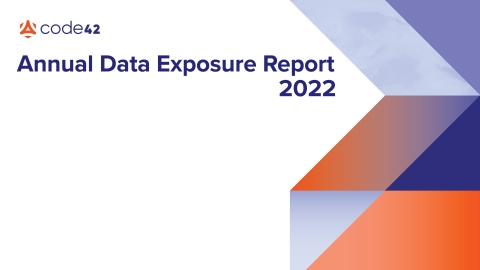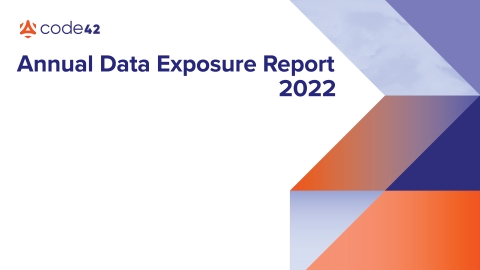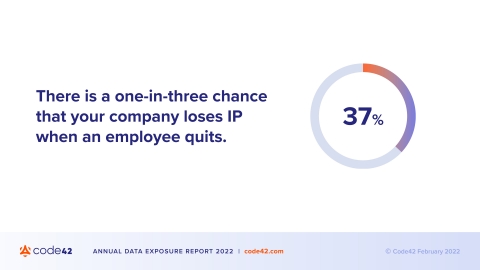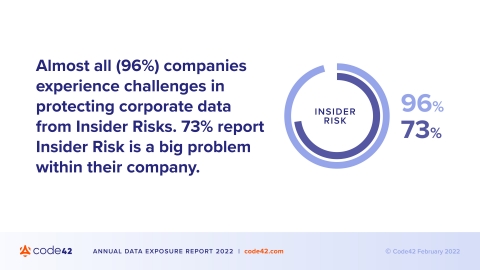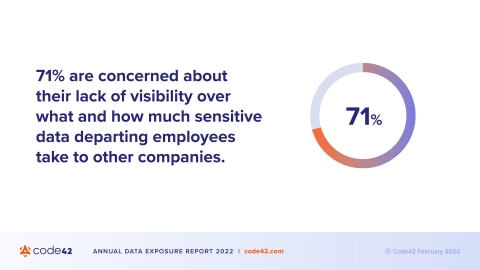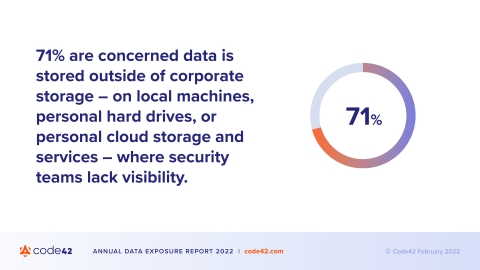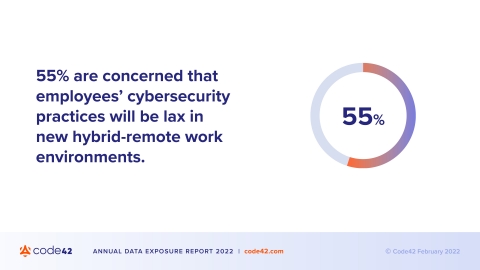MINNEAPOLIS--(BUSINESS WIRE)--Code42, the Insider Risk Management leader, today released its Annual Data Exposure Report for 2022 on Insider Risk. The study, conducted by Vanson Bourne, found that cybersecurity teams are facing unprecedented challenges when it comes to protecting sensitive corporate data from exposure, leak and theft. Identified within the research are three compounding trends increasing the risk to organizations:
- The continued adoption of cloud technologies and a lack of visibility into them.
- The impact of the Great Resignation and departing employees’ theft of IP and sensitive data.
- Ongoing misunderstanding and poor communication between stakeholders at the board, security leadership and security practitioner levels.
When employees quit their jobs, there is a one in three (37%) chance an organization will lose IP. With nearly all companies (96%) noting they experience challenges in protecting corporate data from Insider Risks, it’s clear Insider Risk must be prioritized. However, ownership of the problem remains vaguely defined. Only 21% of companies’ cybersecurity budgets have a dedicated component to mitigate Insider Risk, and the vast majority (91%) of senior cybersecurity leaders still believe that their companies’ Board requires better understanding of Insider Risk.
“With employee turnover and the shift to remote and collaborative work, security teams are struggling to protect IP, source code and customer information. This research highlights that the challenge is even more acute when a third of employees who quit take IP with them when they leave. On top of that, three-quarters of security teams admit that they don’t know what data is leaving when employees depart their organizations,” said Joe Payne, Code42 president and CEO. “Companies must fundamentally shift to a modern data protection approach – Insider Risk Management (IRM) – that aligns with today’s cloud-based, hybrid-remote work environment and can protect the data that fuels their innovation, market differentiation and growth.”
The Great Resignation is increasing concern around data exposure, leaks and exfiltration
In November 2021 alone, a record 4.5 million employees left their jobs, serving as a massive catalyst for data exposure and exfiltration. This level of turnover is causing cybersecurity concerns for 98% of business leaders, cybersecurity leaders and cybersecurity practitioners, who also report a lack of visibility over what and how much sensitive data is leaving their organization.
The study found:
- Nearly three-fourths (71%) don’t know what and/or how much sensitive data departing employees take to other companies.
- That same proportion (71%) are concerned about sensitive data being stored outside of corporate storage where security teams lack visibility.
- Despite an increase in cybersecurity concerns stemming from the surge in remote work, only 43% of respondents report that improving technology for a remote/hybrid workforce is a top two priority for their company.
Culture of disconnect means ownership of Insider Risk remains vague
While almost all companies (96%) experience challenges in protecting corporate data from Insider Risks, there is a disconnect between security leaders, practitioners, business leaders and the Board that is preventing teams from accurately measuring the Insider Risk problem. This impacts how Insider Risk is quantified and presented to senior team members, including the Board.
The study also found:
- Nearly three in five (57%) cybersecurity practitioners report that cybersecurity leaders don’t consult the team when making decisions about their company’s cybersecurity strategy.
- 56% of cybersecurity leaders and practitioners agree that they feel like they don’t have a strong voice in business decisions made by the business leadership team.
- The vast majority (91%) of respondents still believe that their companies’ Board requires more understanding of Insider Risk.
Sustained hybrid-remote work environments push organizations to re-evaluate security awareness training
Companies are still adapting to new ways of working, and it’s clear many organizations will be managing a hybrid workforce for the foreseeable future. Hybrid-remote work heightens security challenges, and many respondents (55%) are concerned about employees becoming lax in their cybersecurity practices. That number is even higher for those in the public sector (70%). The data suggests that companies should examine the frequency, relevance and quality of their training protocol.
The study also found:
- Almost all companies (96%) believe they need to improve the data security training they give to employees.
- Nearly one-third of organizations (32%) say they need to completely overhaul employee security training; 63% of those in the public sector are the most likely to hold this opinion.
Pre-IPO companies are making Insider Risk Management a priority
Intellectual property (IP) is one of the most valuable commodities of a company planning to file an initial public offering (IPO). That, combined with compliance regulations around security controls, means pre-IPO companies must take a closer look at their company’s vulnerability for Insider Risk events. Of all company stages, pre-IPO companies are the most likely to have an IRM program (77%).
The study found:
- 85% of pre-IPO companies cite Insider Risk as a Board-level priority and 82% indicate Insider Risk is discussed at every Board meeting.
- Regardless of company maturity, reputational damage as a result of Insider Risk events is the number one concern across all organizations.
- Loss of IP/customer data is more likely to be a fear for 51% of companies that have had a merger, acquisition or divestiture in the last 12 months than it is for companies that have one planned in the next 12 months (32%). This may be due to the tendency of employees to depart companies post-merger and a fear of those employees taking company data with them when they do so.
The public sector and financial services industry are leading the way in IRM
The public sector (84%) and financial services industry (76%) have the highest percentage of organizations with an IRM program in place and devote the largest proportion of their cybersecurity budget (26% and 24%) to Insider Risk compared to the survey average of 21%.
The study also found:
- While 98% of surveyed companies in the financial services industry report having fears regarding Insider Risk, all industries are concerned about the impacts of an Insider Risk incident.
- Media, leisure and entertainment companies have the smallest average budget allocated to mitigating Insider Risk (16%).
- 58% of companies within the public sector are planning to add new cybersecurity technologies to better monitor file movements.
Additional Resources
- Download the Annual Data Exposure Report: 2022.
- Read the blog: Cloud tech powers the hybrid-remote workforce — and increases Insider Risk.
- Join the conversation with Code42 on our blog, LinkedIn, Twitter and YouTube.
Methodology
Code42 commissioned independent market research agency Vanson Bourne to conduct the Data Exposure Research. The 2022 study surveyed 700 respondents from companies in the US in September and October 2021. All interviews were conducted using a rigorous multi-level screening process to ensure that only suitable candidates were given the opportunity to participate.
About Vanson Bourne
Vanson Bourne is an independent specialist in market research for the technology sector. Their reputation for robust and credible research-based analysis is founded upon rigorous research principles and their ability to seek the opinions of senior decision makers across technical and business functions, in all business sectors and all major markets. For more information, visit www.vansonbourne.com.
About Code42
Code42 is the Insider Risk Management leader. Native to the cloud, the Code42® Incydr™ solution rapidly detects data loss, leak and theft as well as speeds incident response – all without lengthy deployments, complex policy management or blocking employee productivity. The Code42® Instructor™ solution helps enterprises rapidly mature their Insider Risk Management programs by incorporating holistic, hyper-relevant Insider Risk education for end-users to reduce risk events due to accidental and negligent behavior.
With Code42, security professionals can protect corporate data and reduce insider threats while fostering an open and collaborative culture for employees. Backed by security best practices and control requirements, the Code42 Incydr solution is FedRAMP authorized and can be configured for GDPR, HIPAA, PCI and other regulatory frameworks.
More than 50,000 organizations worldwide, including the most recognized brands in business and education, rely on Code42 to safeguard their ideas. Founded in 2001, the company is headquartered in Minneapolis, Minnesota, and is backed by Accel Partners, JMI Equity, NewView Capital and Split Rock Partners. Code42 was recognized by Inc. magazine as one of America’s best workplaces in 2020 and 2021. For more information, visit code42.com or join the conversation on our blog, LinkedIn, Twitter and YouTube.
© 2022 Code42 Software, Inc. All rights reserved. Code42, the Code42 logo, Incydr and Instructor are registered trademarks or trademarks of Code42 Software, Inc. in the United States and/or other countries. All other marks are properties of their respective owners.

